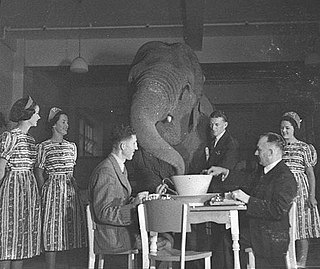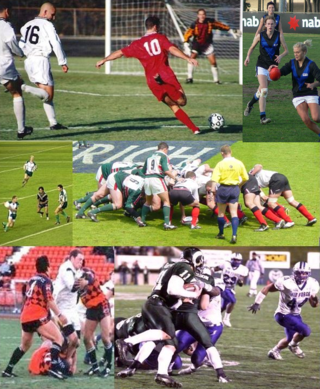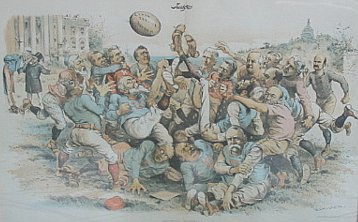In classical rhetoric and logic, begging the question or assuming the conclusion is an informal fallacy that occurs when an argument's premises assume the truth of the conclusion. Historically, begging the question refers to a fault in a dialectical argument in which the speaker assumes some premise that has not been demonstrated to be true. In modern usage, it has come to refer to an argument in which the premises assume the conclusion without supporting it. This makes it an example of circular reasoning.

The expression "the elephant in the room" is a metaphorical idiom in English for an important or enormous topic, question, or controversial issue that is obvious or that everyone knows about but no one mentions or wants to discuss because it makes at least some of them uncomfortable and is personally, socially, or politically embarrassing, controversial, inflammatory, or dangerous. The metaphorical elephant represents an obvious problem or difficult situation that people do not want to talk about.
There are many terms used to describe association football, the sport most commonly referred to in the English-speaking world as "football" or "soccer".
Democrat Party is an epithet and pejorative for the Democratic Party of the United States, often used in a disparaging fashion by the party's opponents. While use of the term started out as non-hostile, it has grown in its negative use since the 1940s, in particular by members of the Republican Party—in party platforms, partisan speeches, and press releases—as well as by conservative commentators and third party politicians.
The New Zealand Liberal Party was the first organised political party in New Zealand. It governed from 1891 until 1912. The Liberal strategy was to create a large class of small land-owning farmers who supported Liberal ideals, by buying large tracts of Māori land and selling it to small farmers on credit. The Liberal Government also established the basis of the later welfare state, with old age pensions, developed a system for settling industrial disputes, which was accepted by both employers and trade unions. In 1893 it extended voting rights to women, making New Zealand the first country in the world to enact universal adult suffrage. The Liberal Party became extremely successful, winning seven consecutive elections and the popular vote in each.
Vox populi is a Latin phrase that literally means "voice of the people." It is used in English in the meaning "the opinion of the majority of the people." In journalism, vox pop or man on the street refers to short interviews with members of the public.

Wets and dries are British political terms that refer to opposing factions within the Conservative Party. The terms originated in the 1980s during the premiership of Margaret Thatcher: those who opposed some of Thatcher's more hard-line policies were often referred to by their opponents as "wets"; in response, supporters of Thatcher were referred to as "dries".

The English word football may mean any one of several team sports, depending on the national or regional origin and location of the person using the word; the use of the word football usually refers to the most popular code of football in that region. The sports most frequently referred to as simply football are association football, American football, Australian rules football, Canadian football, Gaelic football, rugby league football and rugby union football.
A bomb, also known as an up and under or a Garryowen, is a type of kick used in various codes of football. As the names suggests, it is a high kick intended to send the ball relatively straight up so players can get under it before it comes down.
Making a mountain out of a molehill is an idiom referring to over-reactive, histrionic behaviour where a person makes too much of a minor issue. It seems to have come into existence in the 16th century.
Cut and run or cut-and-run is an idiomatic verb phrase meaning to "make off promptly" or to "hurry off". The phrase was in use by the 1700s to describe an act allowing a ship to make sail quickly in an urgent situation, by cutting free an anchor. Though initially referring to a literal act, the phrase was used figuratively by the mid-1800s in both the United States and England. The phrase is used pejoratively in political language, implying a panicked and cowardly retreat, and it has been used by politicians as a criticism of calls to withdraw troops from various armed conflicts, becoming particularly associated with the Iraq War and with the diction of the United States Republican Party. It has also been used in other contexts, such as in World War II military slang and to refer to a container shipping practice.

Owing to its origin in ancient Greece and Rome, English rhetorical theory frequently employs Greek and Latin words as terms of art. This page explains commonly used rhetorical terms in alphabetical order. The brief definitions here are intended to serve as a quick reference rather than an in-depth discussion. For more information, click the terms.
Passing the ball is a key part of association football. The purpose of passing is to keep possession of the ball by maneuvering it on the ground between different players with the objective of advancing it up the playing field.
"Wingnut", wing nut or wing-nut, is a pejorative American political term referring to a person who holds extreme, and often irrational, political views. It is a reference to the extreme "wings" of a party, and shares a name with the hardware fastener also known as a wingnut.
Moving the goalposts is a metaphor, derived from goal-based sports such as football and hockey, that means to change the rule or criterion ("goal") of a process or competition while it is still in progress, in such a way that the new goal offers one side an advantage or disadvantage.

Redneck is a derogatory term mainly, but not exclusively, applied to white Americans perceived to be crass and unsophisticated, closely associated with rural whites of the Southern United States.

Football is a family of team sports that involve, to varying degrees, kicking a ball to score a goal. Unqualified, the word football generally means the form of football that is the most popular where the word is used. Sports commonly called football include association football ; Australian rules football; Gaelic football; gridiron football ; International rules football; rugby league football; and rugby union football. These various forms of football share, to varying degrees, common origins and are known as "football codes".
In American slang, the term inside baseball refers to the minutiae and detailed inner workings of a system that are only interesting to, or appreciated by, experts, insiders, and aficionados. The phrase was originally used as a sports metaphor in political contexts, but has expanded to discussions of other topics as well. Language commentator William Safire wrote that the term refers to details about a subject that require such a specific knowledge about what is being discussed that the nuances are not understood or appreciated by outsiders.
"Out of left field" is American slang meaning "unexpected", "odd" or "strange".






